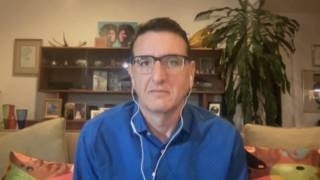
Topics
The state Supreme Court voided the marriages of some 4,000 same sex couples who married in San Francisco earlier this year. The court ruled that San Francisco Mayor Gavin Newsom had overstepped his authority by issuing the marriage licenses to same sex couples. [includes rush transcript]
- Kate Kendell, executive director of the San Francisco-based National Center for Lesbian Rights.
Transcript
AMY GOODMAN: There was also news across the country Yesterday: The announcement out of California that the 4,000 marriages that had been performed in San Francisco had been nullified. This is San Francisco mayor, Gavin Newsom who spoke responding to the decision of The Court. It was the State Supreme Court that voided the marriages of some 4,000 same-sex couples. The court ruled that the San Francisco Mayor, Gavin Newsom had overstepped his authority by issuing the marriage licenses to the same sex couples. This is Mayor Newsom’s response.
GAVIN NEWSOM: Society needs to wake up and say, enough is enough. Discrimination, separate does not mean equal. Discrimination exists in this country and exists against gays and lesbians and bisexuals and it is wrong, and they took a stand. I’m proud of those 4,000 couples. I’m proud of the people that had the courage to make their way to San Francisco, those San Franciscans that had the courage to stand up on principle and say, I do. And there is nothing any judge, lawyer, or politician will ever do to take away the moment those couples shared.
AMY GOODMAN: That was San Francisco mayor, Gavin Newsom. We are joined on the telephone by Kate Kendell, who is executive director of the San Francisco National Center for Lesbian Rights. Your response to the ruling.
KATE KENDELL: I think it’s fair to say that the ruling was not particularly surprising. The court really signaled that they were quite displeased with what the Mayor had done, and even though as a legal matter, I disagree with the conclusion that he overstepped his authority, I think there’s good legal precedence to support it. The bigger issue and more human issue and the one that I’m still feeling pained by is the nullification of the 4,037 marriage licenses. These are not just pieces of paper. They represent a couple. They represent a family. They represent the couple’s choosing to publicly commit to each other, and they represent the first time the government gave legitimacy and respect to those relationships. That respect and legitimacy and the promises of that has been withdrawn. I think it’s a sad time for these couples, and I feel for them.
JUAN GONZALEZ: Now, there is another case, though, making its way up to the court, isn’t there, challenging the actual legality of California’s ban on same sex marriages.
KATE KENDELL: That’s correct. That’s really the most important issue to understand here. The Court made very clear, repeatedly, actually, which was quite heartening, that they were not ruling at all on the merits of whether or not it was constitutional to not permit lesbian and gay couples to marry in California. We were invited, essentially, to file a lawsuit on March 11, when the court ordered the city of San Francisco to stop issuing marriage licenses. They said, but, if somebody wants to file a lawsuit challenging this marriage discrimination in California under the California constitution, we certainly invite that to happen. The very next morning, the National Center for Lesbian Rights, along with the A.C.L.U. and L.A.M.D.A. Legal on behalf of a dozen couples, filed that lawsuit. It is that lawsuit that the court spoke of. They’re aware of it. Just like Massachusetts, Washington state, Oregon, where there’s a lawsuit, New Jersey, where there’s a lawsuit, this issue will ultimately be decided as a constitutional matter, actually by this very court that decided and issued this ruling yesterday. That will probably happen within the next year to 18 months.
AMY GOODMAN: Your response to these two announcements yesterday, the court decision overturning the same-sex couples’ unions, and New Jersey governor McGreevey announcing he is a gay American, and saying he will be resigning.
KATE KENDELL: Yeah. I have to say, you know, we were right in the heat of all the response to the Supreme Court ruling, and then, you know, immediately coming across our email is the content of McGreevey’s statement. I suppose I was a little bit troubled by McGreevey’s statement. Because, while I understand that he is now embracing his identity as a gay men. I appreciate that and I definitely agree with my colleagues that the coming out process is a painful and deeply personal one for some folks. Painful for some. You know, the fact is he’s been able to write a lot of privilege, undeserved privilege, as being seen and experienced by the voters as a straight man, and I do think there needs to be a little bit of a reflection on his part that he has had a lot of heterosexual privilege because he hasn’t been out or honest or open about who he truly was, and so, I do think there’s more to the story. There’s more to be told. I certainly don’t think he’s disqualified from office. I don’t even think he is resigning because he’s actually gay. The issue is really more of what was said on the program. There are other scandals surrounding some of what has gone on. The extra marital affair, regardless of whether it was with a man or woman is problematic in public office now. I do think that there’s a lot more to his situation that should be reflected upon.
AMY GOODMAN: I want to thank you both very much for being with us. We have been joined by Kate Kendell, who is director of the San Francisco National Center for Lesbian Rights and on the line with us from New Jersey, Laura Pople, New Jersey Lesbian and Gay Coalition.













Media Options